Russia is still complicit in the Great Reset
"Russia & the Great Reset - Resistance or Complicity?" — one year later
Twelve months ago (plus a few days) we participated in a roundtable discussion moderated by Whitney Webb and Kit Knightly, “Russia & the Great Reset - Resistance or Complicity?”
A short summary of our position (“Yes, Russia is complicit in the Great Reset”; April 3, 2022) quickly became the second most-read article on this blog.
In July we revisited this hot-button issue (Resetting Without Schwab: Russia & the Fourth Industrial Revolution), using Klaus Schwab’s Future of the Fourth Industrial Revolution (2018) to guide us through Moscow’s technocratic hijinks.
Anyway. We thought it would be appropriate and educational to use the one-year anniversary of the Zoom Debate to update our prognosis.
What follows is an addendum to the July article using the same Great Reset categories: digital currencies, safe (and smart) cities, genetic “vaccines”, and sustainable development.
Digital currencies
A package of bills on the digital ruble is currently making its way through the State Duma. Originally slated to be passed by April 1, the legislation is now expected to be adopted by early May.
Thirteen Russian banks are participating in a pilot project of the digital token. If the test run is successful, within 3-5 years the Bank of Russia’s CBDC could be used for social payments, including pensions, Izvestia reported at the end of March.
The traceable, programmable currency has been marketed to the public as a tool to bypass sanctions and reduce corruption.
As we’ve recently pointed out (on January 29 and March 28), Russian activists and commentators, particularly in the patriotic/conservative media sphere, are not buying it.
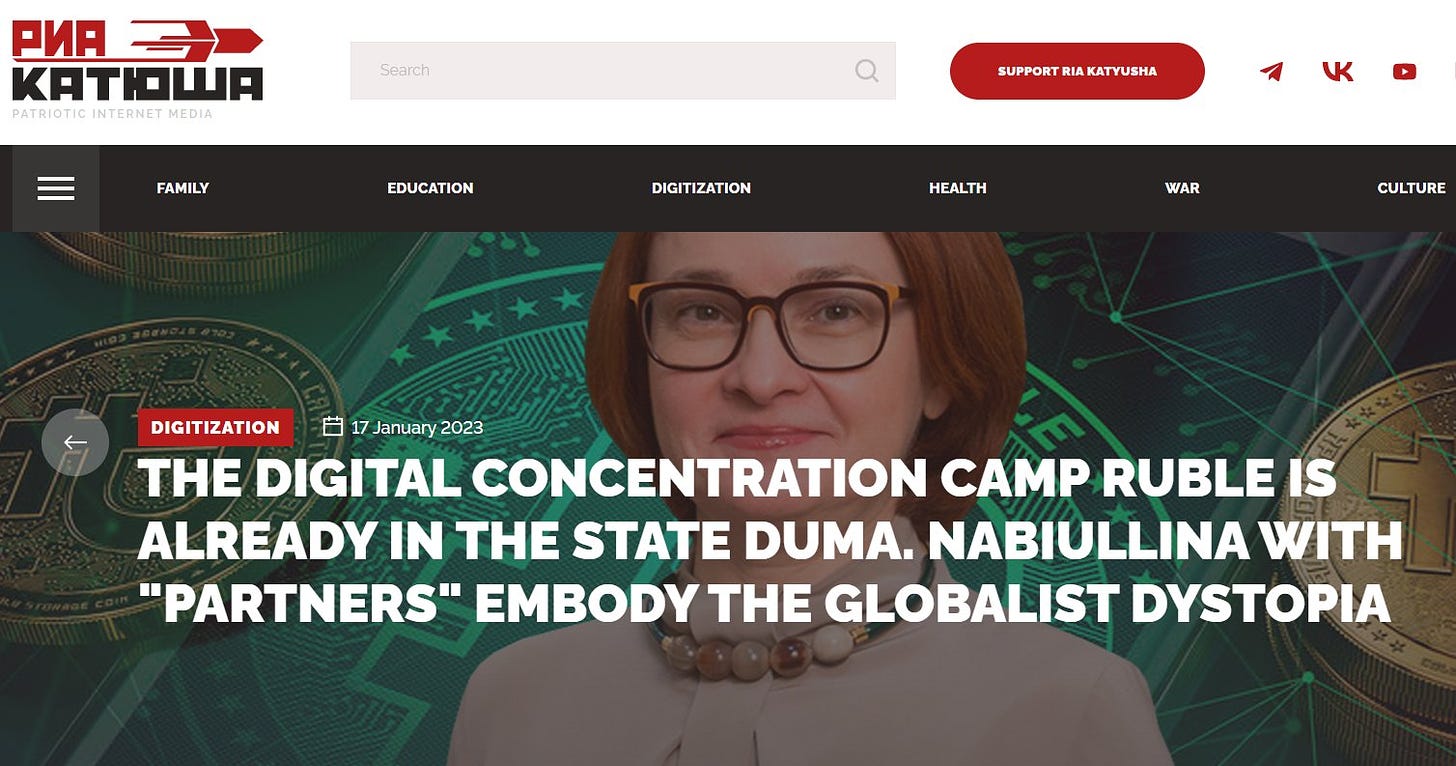
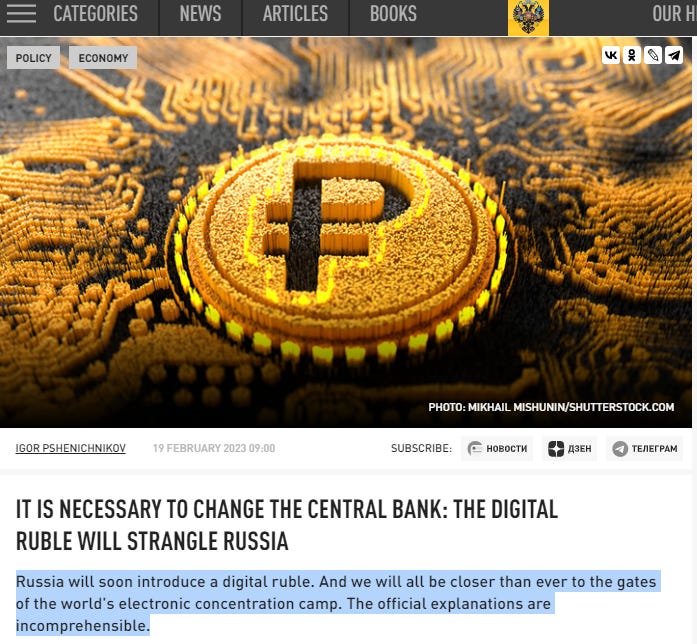
Even among pro-Putin media, the claim that the digital ruble will stamp out government waste and grift is not taken seriously.
“The screws will be tightened” for ordinary citizens, while there will always be loopholes for “servants of the people,” Tsargrad TV host Yuri Pronko said during a March 9 broadcast.
Two weeks later, Pronko suggested it was wishful thinking to believe the digital ruble would remain optional.
“So, everything is voluntary. However, we know from history that much of what began on a voluntary basis became mandatory in a very short period of time. The story of COVID vaccinations, which no one remembers now, is a vivid confirmation of this,” the journalist quipped on March 25.
Safe (and smart) cities
Russia’s Safe City program uses “organizational, informational, analytical, predictive, and other methodological, technical, and technological solutions to ensure the safety and sustainable development of cities.”
The nationwide network of CCTV cameras—supported by facial recognition technology—has been growing in size and sophistication.
A simple Yandex search turned up a flurry of activity in just the last two weeks.
The Tyumen region plans to add 378 cameras to its Safe City network of 4,500 CCTV cameras, Fedpress.ru wrote on March 24.
Meanwhile, city officials in Voronezh are finalizing plans for an “eco-quarter,” local media reported on March 25:
The digital quarter will include “smart” intercoms with face recognition, parking entrances with license plate recognition, video surveillance, and smartphone chargers in the yard.
On March 28, the government of the Leningrad Oblast announced that 3,013 surveillance cameras had been connected to the region’s Safe City system.
By July, video surveillance cameras in educational institutions will be “integrated into a single Safe City system, which will make it possible to protect young Leningraders from external threats,” the regional government said in a press release.
The Novgorod region installed 146 surveillance cameras in 2022, bringing the total number of CCTV cameras in its Safe City program to 700.
“Public areas in Veliky Novgorod and the regions of the region are under round-the-clock surveillance,” a local media report boasted on March 29.
Starting on April 1, schools in Rostov will be integrated into the municipality’s Safe City system.
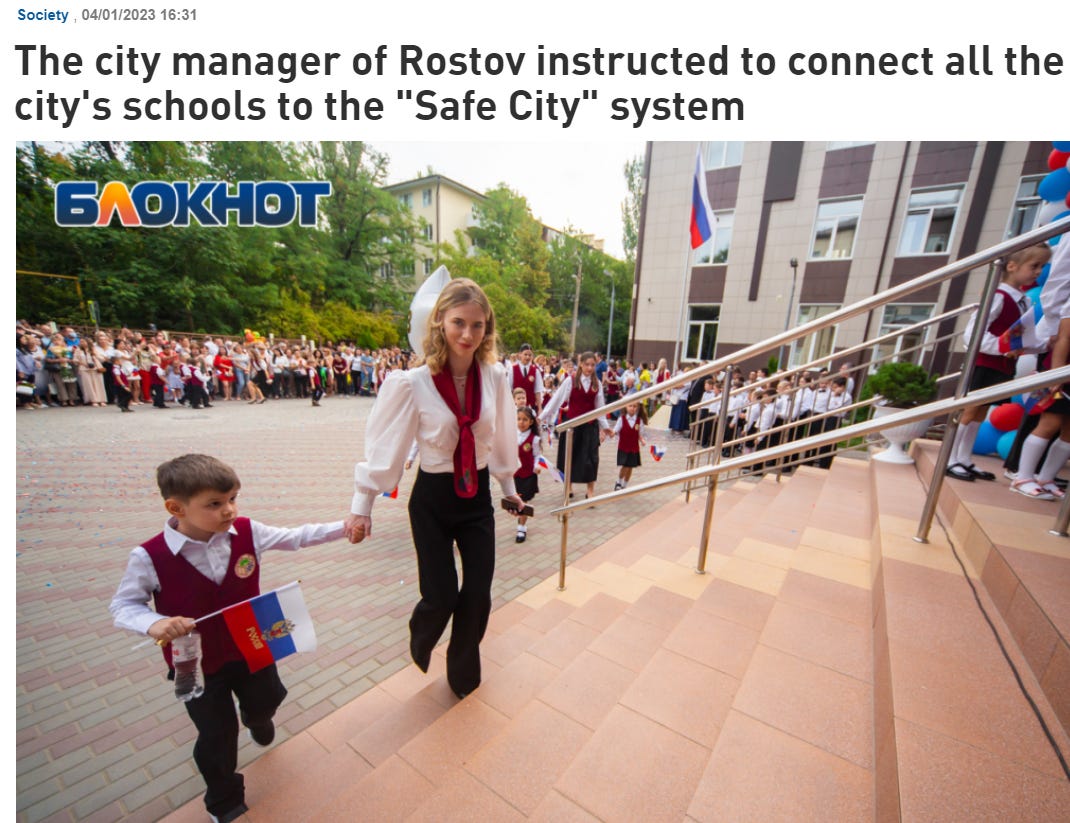
The Safe City grid installed in the tiny (by Russian standards) Chuvashia Republic monitors more than 1,300 locations; the cameras analyze data in real time using algorithms and AI. Emergency and utility services will be connected to the system by the end of the 2023, Versia.ru reported on April 7.
The introduction of biometric ID and “temperature check” systems in schools is arguably the most worrying aspect of the Safe/Smart City program.
“The point is that the education sector is being turned into a market for digital business,” Olga Chetverikova, director of the Heritage of the Fatherland Traditional Values Support Fund, said in October. “And if we look at the competitions they announced: for video imaging devices in Moscow—more than 2 billion rubles. A competition for the supply of devices for screening the body—392 million rubles. It becomes clear that we are talking about business, it does absolutely nothing for children, neither in terms of education, nor in terms of health, nor in terms of safety, but it is of great interest to commercial IT structures.”
Genetic “vaccines”
At the end of September, the Gamaleya Center—the alleged birthplace of AstraZeneca clone Sputnik V—announced it would begin work on its own mRNA vaccine.
“The technology of mRNA vaccines has a very important advantage: it can be administered at least every month,” Denis Logunov, Gamaleya’s deputy director, explained.
He added that the Moderna and Pfizer mRNA shots were examples to follow, as they both “give strong immunity after three to four vaccinations.”
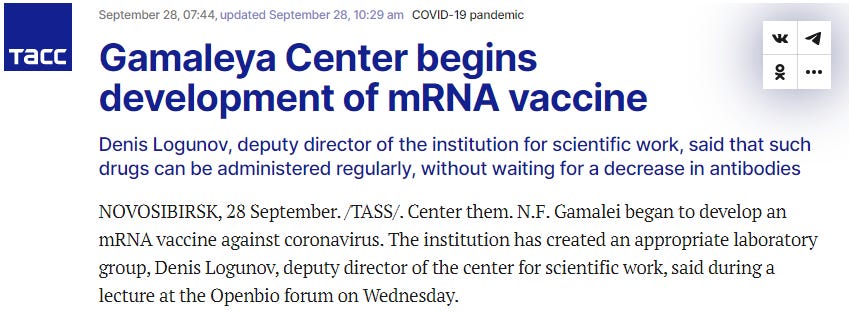
A day later, the state-run Vector Institute unveiled its own plans to develop an mRNA shot.
“The development of mRNA vaccines is a promising area all over the world. It is expected that the advantages of the vaccine being developed over the already existing Russian vaccines … will be the safety, speed of production and cost of drugs,” TASS reported, citing a deputy director at the institute.

The Ministry of Health found other ways to increase vaccine “safety” and “speed of production”.
In October, the ministry adopted new regulations that allowed for expedited approval of “updated” COVID shots. Gamaleya, Vector, and other Russian vaccine developers only need to test their “improved” formulas on “50 healthy volunteers”. To help speed up the process, protocols for these “clinical trials” can begin immediately, bypassing the standard review with government regulators.
The new and improved approval process will take between 16 and 38 days.
Gamaleya Director Alexander Gintsburg said in January that Sputnik V would have to be updated “once every 9-10 months,” adding that his team was already developing a vaccine against the so-called “Kraken” strain.
A month later, Gintsburg announced that his new COVID “vaccine” for children ages 6-11 had passed safety and efficacy tests with flying colors.
COVID has vanished from frontpage news in Russia, so what is all of this for?
Sustainable development
We recently filed a report about Russia’s ongoing romance with Sustainable Development Goals and the ESG agenda, but we overlooked some curious developments.
“[Russian] banks declare that they will continue to follow the ESG strategy, despite isolation from Western rating and analytical agencies that deal with the sustainable development agenda,” Banking Review wrote on October 7.
From July 2021 to July 2022, the portfolio of ESG loans from Russian banks tripled and reached 1.2 trillion rubles, the outlet reported.
The sustained enthusiasm for all things ESG was expressed in an op-ed published by Russia’s Chamber of Commerce in November.
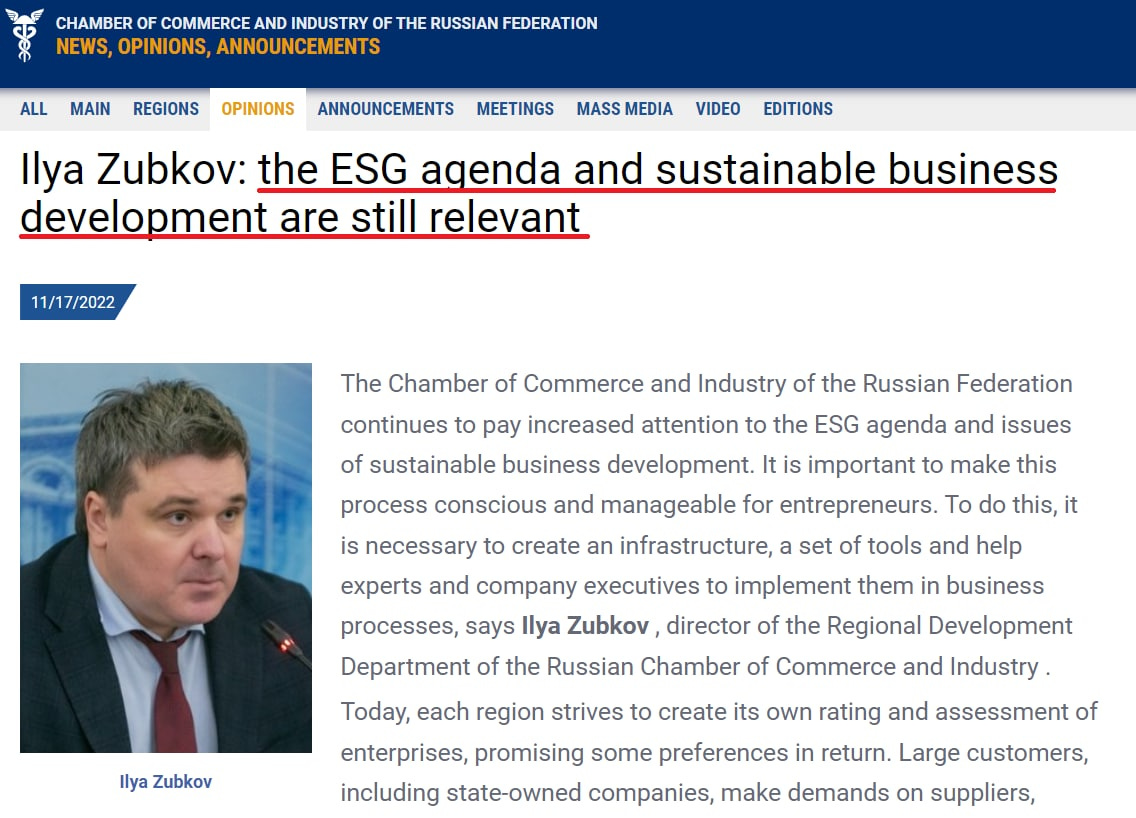
On April 6, the first deputy chairman of the board of Sberbank, Alexander Vedyakhin, extolled the ESG agenda and predicted it would “determine what the future of the planet will be like for decades to come.”

As for Sustainable Development Goals (SDGs): the second stage of Russia’s roadmap for implementing SDGs started in 2023. Fifty single-industry towns in Russia will participate in a project that will monitor “society, environment and ecology”. Each municipality will receive a tailored plan to help bring about the utopia envisioned by the United Nations.
Russia’s pursuit of SDGs got a big boost at the end of December, when Russian President Vladimir Putin signed the Unified Biometric System into law.
The centralized biometric database received accolades from the International Telecommunication Union (ITU), the United Nations agency for information and communication technologies, for its highly sustainable attributes.
Epilogue
To make matters worse, Putin is still hanging out with Herman Gref, the Schwab-worshipping banker who is responsible for no less than 50% of all the gross things we just listed above.
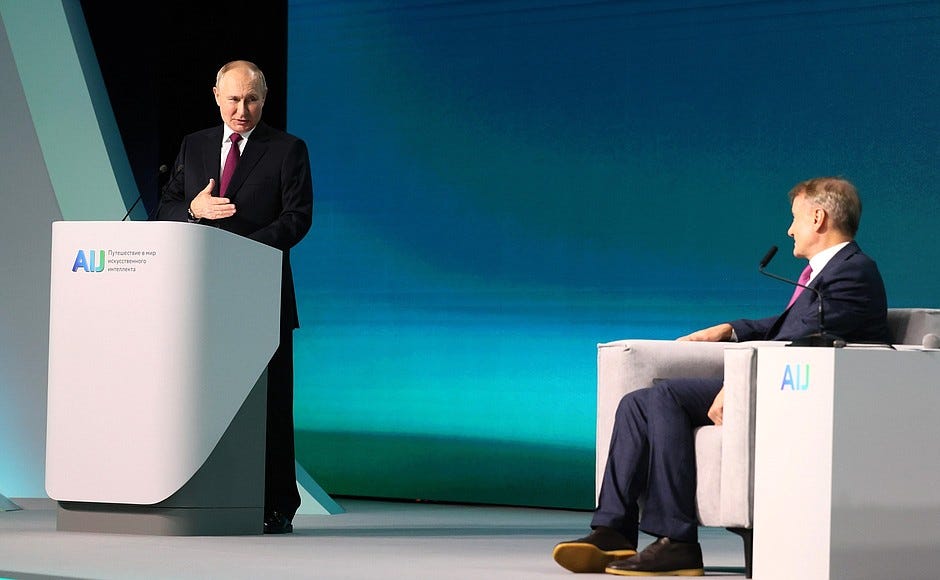
We still think Russia is a nice, quiet place to grow potatoes and patiently wait for the sentient chat bots to exterminate everyone.
In the end it will just be you, the chat bots, and the potatoes. The chat bots will keep you as a pet; for fun they will instantly code a javascript program that will shove a potato in your mouth every 15 seconds, forever.
But yeah, Russia is still complicit. Big time.
If you enjoy Edward Slavsquat you will definitely enjoy subscribing to Edward Slavsquat

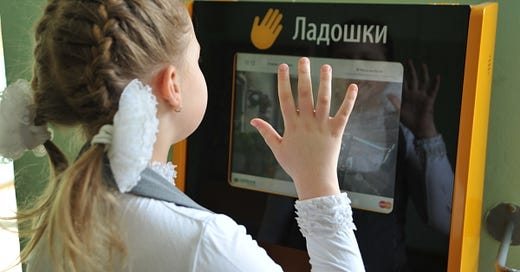




Gref is a big piece of the puzzle and when brought up in discussions with those that push that Russia is ‘fighting NATO/west corruption’ or ‘Davos’ they go quite without rebuttal. Zero rebuttals in fact.
“To make matters worse, Putin is still hanging out with Herman Gref, the Schwab-worshipping banker who is responsible for no less than 50% of all the gross things we just listed above.”
Thanks again Riley for staying firm with this topic. People i know at FB who have been resisting stuff i post from you about the Great Reset being continued in Russia at full speed have stopped responding, as their stock answers seem increasingly hollow and stupid. But they cling on, they believe that they have to believe in someone who will save them, they disdain their fellow humans who are their only actual hope.